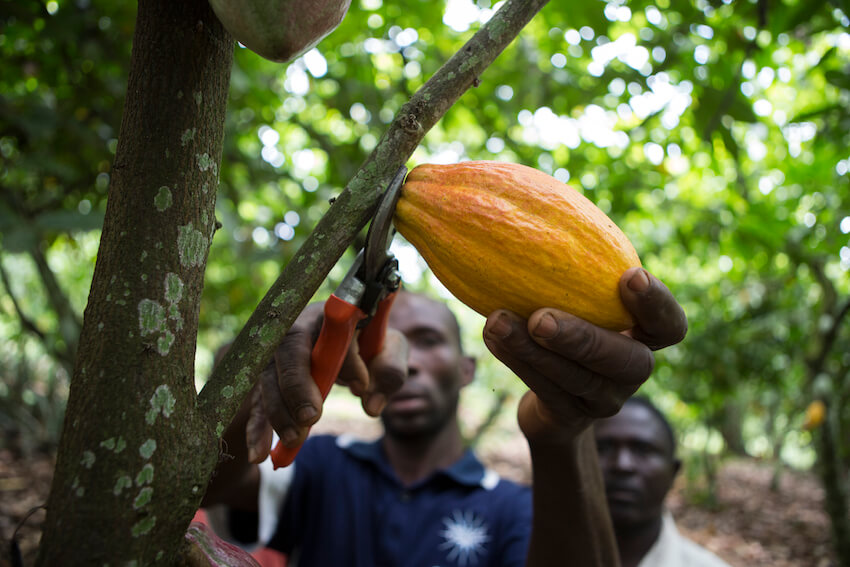COCOA FARMERS in the Ivory Coast are set to earn higher prices for their beans as Ben & Jerry’s ramps up its living income approach for farmers in partnership with Fairtrade.
Around 5,000 Fairtrade cocoa farmers in Ben & Jerry’s supply chain will receive approximately an additional $600,000 over the next year. This amount is on top of the annual Fairtrade Premium of around $970,000 and the Ivorian government’s minimum price for cocoa that all companies are required to pay. The extra money that farmers will now receive is an important part of Ben & Jerry’s wider efforts to support farmers towards closing the living income gap.
Cocoa farming is an incredibly unpredictable business, and farmers bear the risk of losses caused by climate change and extreme weather patterns.

Smallholder cocoa farmers also have virtually no control over global market prices and are at the mercy of price volatility. Inequality in the cocoa chain means farmers are trapped in extreme poverty and can’t afford to invest in more progressive farming methods to improve their income or adapt to a changing climate. In turn, rural communities are held back and the natural environment suffers.
“We’re committed to working for economic justice through our ice cream”
Ben & Jerry’s global values-led sourcing manager Cheryl Pinto
A living income is enough to provide decent housing and health care, clean water and education, plus a little extra for unexpected events, helping to break the cycle.
The higher prices Ben & Jerry’s will be paying are the latest step in a package of living income interventions that they have implemented together with Fairtrade since 2015.
These activities include productivity, diversification and co-operative strengthening which together support a living income strategy for the future. The higher prices will be closely monitored through partners on the ground to understand exactly how they contribute towards a sustainable livelihood for farmers.

Ben & Jerry’s global values-led sourcing manager Cheryl Pinto said: “We’re committed to working for economic justice through our ice cream, and now we’re making history by ramping up our commitment with the cocoa we buy. Starting with the cocoa in our chocolate ice cream mix, we’re working towards the Fairtrade Living Income Reference Price for cocoa farmers, and this is the beginning. We are exploring living incomes in our other global supply chains, too.”
Ben & Jerry’s purchases across all commodities have generated $3.6m in Fairtrade Premiums in 2019 for farming communities to spend as they choose. Many have funded schools, and invested in climate resilience and local infrastructure.
Louisa Cox, Fairtrade’s director of impact, said: “It’s complex work to advance towards a living income, but both organisations are committed to this vision. Ben & Jerry’s recognises the role of business in addressing the challenges in the cocoa sector and this commitment sets a great example for other companies to follow.”


Comments Form
1 Comment
Planet Earth’s African-heritage men and women cannot and will not be treated with dignity until the agricultural and mineral wealth of Africa is exclusively used to benefit; provide infrastructure and Public Services to the people of Continental Africa.
70 % of the world’s Cocoa from which chocolate is made comes from Africa. However, Africa’s Cocoa Farmers do not earn enough money to send their children to junior school.
How can this situation be tolerated in the era of “fairtrade?”
Zambia produces the lion share of the world’s copper, but the government and people of Zambia do not benefit from Glencore copper mining wealth.
If Zambia had professional Public Service Government Ministers, Zambia’s cooper mineral wealth would have provided the wealth for great Public Services; especially healthcare and education.
Coltan which is essential for electric vehicle batteries; mobile phones and computers is mined by the people of the Congo.
The Congo miners are paid a friction of the world price for the coltan; and the Congo’s environment is being destroyed by the mining pollutants.
The Ogoni region of Nigeria has been polluted by leaking Oil pipelines. The majority of the Nigerian people do not benefit from Nigeria’s oil wealth.
African people will RIGHTLY continue to be regarded as inferior people; with unaccountable and self-serving government Ministers.
African-heritage men and women still have a penchant for savage violence directed against their fellow African neighbours on the continent of Africa; and also, in Chicago and even London.
Until we as African-heritage men and women can begin to address our African-heritage character faults, the African continent and people of African-heritage globally will be treated by the rest of the world as inferior men and women: who are unable to justly govern their wealthy African continent; or put an end to the senseless African-heritage peer-to-peer violence that causes the deaths of thousands of African-heritage men, women and children in Chicago; Detroit and London.